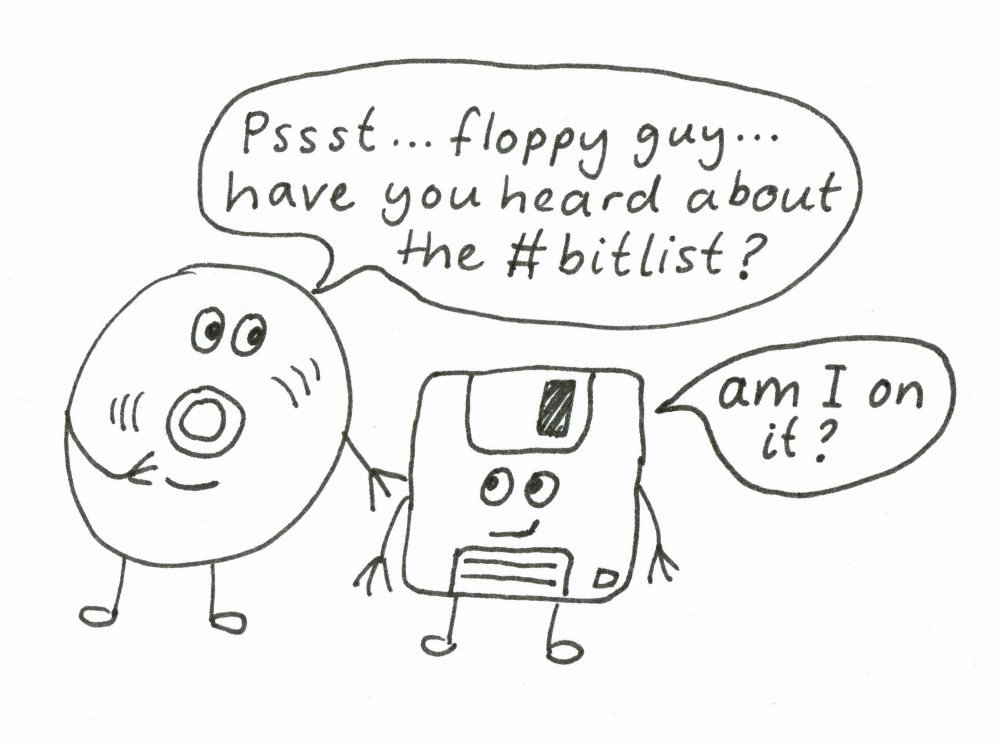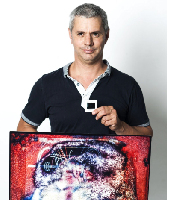Blog
Unless otherwise stated, content is shared under CC-BY-NC Licence
Keeping Blogs Alive
Kelly Merks works at the Expatriate Archive Centre in the Hague, Netherlands
The Expatriate Archive Centre (EAC) is an independent non-profit foundation. We aim to collect and preserve expatriate life stories, regardless of a person’s country of origin or where they moved to. Our focus is primarily on unique personal writings. Though much of our collection is tangible — including photographs, letters, diaries and other documents — in recent years we have begun to collect born-digital material.
Des cerises sur le gateau de la préservation digitale / Cherries on the cake of digital preservation
Jen-Yves Le Meur is Digital Memory Project Leader at CERN in Geneva, Switzerland
Le projet de la Mémoire Numérique du CERN, commencé en 2016, se devait de s’attaquer en priorité à la sauvegarde des collections sonores, photographiques et audiovisuelles nées avec l’institut en 1954, et déjà menacées par l’obsolescence de ses supports. En charge de ce projet, je me suis lancé tête baissé dans les inventaires, classifications, regroupements, analyses des pratiques, spécifications, appels d’offre et recherches de fond sans me douter un instant des magnifiques surprises qui orneraient ce chemin.
Ce sont ces surprises que je veux partager ici, à l’occasion de cette journée mondiale de la préservation. Elles sont quelques cerises sur la gateau de notre héritage. Cerises qui donneront peut-être une motivation supplémentatire à tous les acteurs engagés dans des projets de ce type.
Digital preservation at home……. and beyond
Joost van der Nat is a researcher for the Dutch Digital Heritage Network. In 2016 he and his team won the DPC Digital Preservation Award for Research and Innovation.
A short, personal story of how Digital Preservation came into my life, and the way our household deals with it now. Some astounding figures on how the world is expanding its digital universe lead to a burning question…
n=1, or how digital non-preservation showed its ugly face to me
When I try to explain to Muggles (the major part of the population that is ignorant of the blessings of, and the need for Digital Preservation) what Digital Preservation is all about, I often give the example of the scenario that took place in 2004. A trip to New York with our then 11 year old son. I made a lot of video recordings, and spent 60+ hours in producing a home video of 30 minutes on a DVD. Menus and Gershwin’s music topped it off, a great success with family and friends. Then 3 years later the DVD wouldn’t play. Bit rot or low quality DVD? But no problem, of course I had a backup on a separate hard disk. And as you may guess, the hard disk didn’t function… A company called The Disk Doctor saved me, for the round sum of € 750. Lesson learned: store your stuff in the cloud (too).
n=2, or how our household deals with its (digital) objects
Over the years E (my better half) and I have collected significant amounts of recorded music. Vinyl to start with, and countless CDs as of the 1990-ies. Digitising LPs is fun, but time consuming. Fortunately the vinyl collection was not too big. Ripping 600+ CDs and finding and applying cover photos in the course of 15 years is achievable. The music, along with other stuff, is stored on a Synology NAS that is backed up to Amazon Glacier in Ireland for $ 2.34 per month (600 Gb). The point is however that nowadays Spotify has (almost) all of our music at a fingertip.
The same goes for DVDs. In the course of many years the collection of movies grew up to 150+ (modest, compared to some friends). At present Netflix is streaming a lot of this content straight into our home.
Old family photo albums are great. Altogether we have some 15, containing priceless pictures dating back to the early 1900’s. On the pictures one can look back in time, seeing familiar faces in their young versions, and historic views of modernized places. Digitising these albums is fun, Photoshop slowly reveals its secrets and the result is spectacular. The extended families love it. Minor details is the meta data. The date a picture was taken is often not available, and some of these faces must be family, but who is it again ? Too late to ask…
And then, as of the early 2000’s, the digital camera came into our lives. The number of pictures was not longer limited to the 24 or 36 one would have on an analogue camera. An influx of 100’s of pictures per year in the household was manageable. However, soon the camera became part of the smartphone (or is it the other way round ?), and things got worse. E. travels a lot, and loves to share places, moments, people, diners, outings, seminars, nature, odd pictures, and what not. The potential ingest of pictures of her phone is now well over 2.000 per year. As many of these pictures are instantaneously shared with WhatsApp (in various groups) the number of files is likely to be around 4.000. duplicates included. The family curator is in trouble…
Recently I heard of Gudak. This is an app for the smartphone that will let you make 24 pictures, no reviewing. You then wait 3 days before you can check the results. I am going to try to replace the camera function of E’s phone with this app.
All in all our household seems to have reached the maturity level of “backed up bit preservation”. Which is something…
n = zetta, or how the world develops its digital universe
Now only imagine what the above n=2 story turns into when you realise that the number of active mobile social users in the world in 2017 has come to well over 2.5 billion (a third of the world population, see We are Social and Hootsuite). In 2015 Bernard Marr gave some staggering figures in Forbes:
- Facebook users send on average 31.25 million messages and view 2.77 million videos every minute.
- We are seeing a massive growth in video and photo data, where every minute up to 300 hours of video are uploaded to YouTube alone.
- In 2015, a staggering 1 trillion photos will be taken and billions of them will be shared online. By 2017, nearly 80% of photos will be taken on smart phones.
- The data volumes are exploding, more data has been created in 2013 -2014 than in the entire previous history of the human race.
- Data is growing faster than ever before and by the year 2020, about 1.7 megabytes of new information will be created every second for every human being on the planet.
IDC forecasted in 2017 that by 2025 the global data sphere will grow to 163 zettabytes (a zettabyte is a trillion gigabytes [JvdN: A trillion seconds is 31,710 years, to give you an idea.]). That’s ten times the 16.1 Zb of data generated in 2016.
Now my conclusive question is: either the Digital Preservation Community comes up with some ideas on how to tackle this, or should we say “Digital Preservation, don’t try this at home !”?
I do not have the answer (yet ;-). Maybe the industry has, in the longer run?
(Already) 10 years of LHC Data Preservation
Jamie Shiers is Data Preservation in High Energy Physics Project Leader at CERN
From the early days of planning for the Large Hadron Collider (LHC) it was known that it would generate an unprecedented amount of data. As we come to the end of the 2nd multi-year run (Run2) of the LHC, the CERN data archive has broken through the 300PB barrier. The LHC, including its planned upgrades, such as the High Luminosity LHC, will continue to take data for between one and two more decades when it restarts for Run3 in 2021 (so around 3 decades from start to finish).
All of this data – past, present and future – will need to be preserved for at least the data-taking period of the LHC, if not for an extended period thereafter.
NULLA DIES SINE LINEA …DIGITAL: What is and what is not digital preservation? Or the need for a few mantras
Isabel Bordes Cabrera es Jefe de Área de Biblioteca Digital, Biblioteca Digital Hispánica a la Biblioteca Nacional de Españaña / Isabel Bordes Cabrera is Head of Area at the Hispanic Digital Library at the National Library of Spain
Because of the world digital preservation day (#WDPD2018) we’ve wanted to take a break so to think and explain what is digital preservation, what is not and why this need arrived to memory institutions.
In our personal lives we've all experienced ourselves losses of digital data: that CD or USB with pictures of our last summer that won’t ever open again, that computer that can’t read DVDs; that wordperfect file which we cannot longer open nor edit, that corrupted file that cannot be recovered, that videogame we can no longer enjoy because we no longer have that commodore 64 which delighted us on those rainy evenings…The challenges of digital preservation have knocked everyone’s door, and not even NASA is an exception. Furthermore, NASA was one of the first institutions to react when they realized that almost all data from Viking probes were lost. And this was true even when they thought they had solved the problem back in the 90’s when they transferred data from the original magnetic tapes to CDs. And why was that? Because formats were not readable and the original programmers were either dead or had already left NASA. These facts put the machine to move and digital preservation turned into an undeniable challenge to all of us.
Preserving and providing access to digitally-born documentation
Frédéric Blin is Director for Heritage Collections, Preservation and Digitisation at the National University Library in Strasbourg, France
If all libraries are faced with providing access to digitally-born documentation, not all of them have the responsibility to preserve this documentation for the longer term. This is mainly the task of national libraries, or libraries bearing legal deposit responsibilities. International programmes and consortia have been created between libraries and publishers to keep academic resources secure, or between national libraries for the preservation of Internet. Academic libraries have been active in the field of research data preservation, in collaboration with institutional or shared data storage services.
For an autonomous medium-sized library, having the responsibility to preserve the regional heritage including the one coming through legal deposit, while at the same time trying to serve research needs based more and more on access to and use of digitised material, digital preservation is a question that tends to be at the back of the professional’s minds, leading however to no clear solution.
What we learned from Leren Preserveren
Frans Neggers is Digital Archivist at Het Nieuwe Instituut, and Project Manager and Trainer for Leren Preserveren
What should teaching heritage professionals about digital preservation be about? Autumn 2016 we - the Dutch Digital Heritage Network (DDHN) and Het Nieuwe Instituut (Rotterdam) - started developing Leren Preserveren (Learning Digital Preservation). We commissioned a professional to make a educational design. Decided was that it should become a blended learning environment for online students and with a group training. The target group was defined as practitioners that maybe don’t know too much yet about digital preservation or don’t know how to apply their knowledge. So it does not serve the more experienced practitioners who already know ‘how to’, nor the ones who are looking for answers to specific problems. Then all things to be learned had to be brought within a logical learning process. This resulted in a three module setup (learning to speak the language of digital preservation, becoming able to consider digital preservation in your own situation and learning to take the first steps). Important part of the group training were the module assignments as well as the expert sessions and exercises.
Digital Preservation and the Grand Gallery of IT Evolution
Eng Sengsavang is Reference Archivist for United Nations Educational, Scientific and Cultural Organization (UNESCO) in Paris, France
Last autumn, I moved to Paris to take on the role of Reference Archivist at the United Nations Educational, Scientific and Cultural Organization (UNESCO). My morning commute begins on a network of streets named after some of France and Europe’s prominent 18th-century naturalists. Rue Geoffroy Saint-Hilaire takes me past the Jardin des Plantes, site of the National Museum of Natural History (MNHN). The MNHN houses, among other displays, the Gallery of Evolution, an immense space exhibiting varieties of taxidermied animals. On the ground floor, an African elephant heads a procession forming the centerpiece of the ‘grand gallery,’ so-designated in French.
What if … your smartphone movies were suddenly all erased?
Brecht Declercq is Manager of Digitisation and Acquisition at VIAA, the Flemish Institute for Archiving in Belgium
There it is, lying next to you. Or maybe it is in your handbag or pocket. It may still be on your bedside table. Or your children are messing with it. Yesterday you used it to make some video clips. From your partner, your parents, your children, your BFF or just from the car before you. You probably didn’t think about it, but you documented your life in images and sounds. Some clips you erased quickly ... they better be not saved! Others are very valuable to you. Your 3-year-old granddaughter pressing a wet kiss on your camera lens. The champions celebration of the hockey team of a dear friend. Grandpa's voice at the birthday party ... three weeks before he died unexpectedly.
BitList 2018: The Global List of Digitally Endangered Species
 The 2018 Revision of The BitList offers a chance to update and review progress since initial publication in 2017. It was always intended as an interim statement that identified major changes or trends but offering commentary rather than a comprehensive review. It designed around the commitment that the DPC makes to the Digital Preservation Awards in alternate years, recognizing that the capacity for a full review would be limited in Autumn 2018. However, the pace of change is also relatively slow so the appetite and impact of an annual revision would be limited.
The 2018 Revision of The BitList offers a chance to update and review progress since initial publication in 2017. It was always intended as an interim statement that identified major changes or trends but offering commentary rather than a comprehensive review. It designed around the commitment that the DPC makes to the Digital Preservation Awards in alternate years, recognizing that the capacity for a full review would be limited in Autumn 2018. However, the pace of change is also relatively slow so the appetite and impact of an annual revision would be limited.



















































































































































